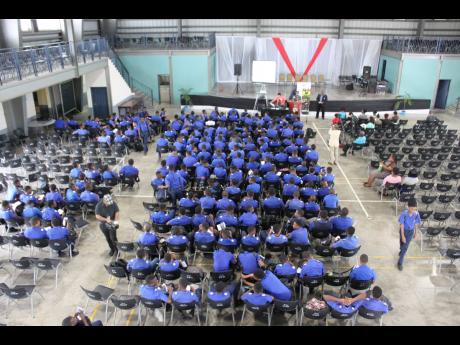Editorial | Mobilising for education
The Holness administration has given itself a chance for a reset of the education transformation project and to mobilise Jamaicans behind the initiative. It should grasp it.
Last week, in a further reminder of how the cart was hitched in front of the horse, Fayval Williams, the education minister, tabled in Parliament a progress report on the implementation, after the first year, of the recommendations of the Patterson Commission on education transformation. There are seven more years of implementation to go.
The minister also did, or rather said, something else. She agreed that “a national dialogue” to build consensus around what is to be done to improve education outcomes would be a good idea: that is, getting to the nitty-gritty of the issues with stakeholders, including that at the community level. While a slick advertising campaign around TREND (transforming education for national development) might cause a bit of gawking, it doesn’t address substance, and neither does it rally people to action.
“Beyond TREND we have been speaking to as many stakeholders as possible,” Ms Williams, responding to an opposition member’s suggestion of the need for the “national dialogue” on education reform.
“It would be great to bring an entire Jamaica focus – if we could just get a virtual discussion with all Jamaicans, that would be perfect,” she added.
A mass gathering of all Jamaicans, virtual or otherwise, is, of course, impossible. Minister Williams spoke metaphorically. And neither can mobilising Jamaicans behind the idea of education transformation, having them ownership of it, can’t, and won’t, be achieved in a single sweep. It demands a hard, relentless, in-the-trenches, slog.
PATTERSON REPORT
Like others before it, the Patterson Report, released two and half years ago, was intended to propose a framework for reversing the poor education performance of Jamaican students. Among the things the commission noted was that at the time, only 55 per cent of the children who wrote the Primary Exit Profile (PEP) exam – that is, grade six students who were about to enter high school – were proficient in language arts.
“A breakdown of the language arts results indicated that a third of students at the end of primary school could not read, 56 per cent could not write, and 57 per cent could not identify information in a simple sentence,” the report said. The outcome in maths was worse.
At high school, of the students who did the Caribbean Secondary Education Certificate (CSEC) exams, 28 per cent managed to pass five subjects, including maths and English, in a single sitting. And this is after many students from the exam cohort are culled by many schools after mock tests or teachers’ assessments of their likely performance.
Further, fewer than three in 10 Jamaicans go on to tertiary education, and over six in 10 workers have neither training or certification in the jobs they perform.
As Minister Williams told Parliament last week, the Patterson Commission offered 365 recommendations for turning things around, ranging from an overhaul of the education ministry, to restructuring teacher training and the governance systems in schools, and the formulas for funding educations, including a rebalancing that steered more resources to the early childhood sector from the overfunded vocational training system that lacked the absorptive capacity.
The Government has broadly accepted the Patterson findings and has begun, per the report tabled by Minister Williams, implementation work on 101 of the 145 recommendations earmarked to be completed between 2023 and 2026. A broad-based Education Transformation Oversight Committee (ETOC) monitors the implementation.
UNAWARE OF THE REPORT
However, the majority Jamaicans remain unaware of the report, its findings or basis upon which the 101 prioritised initiatives were selected. But this ignorance isn’t confined to ordinary folks. It was obvious when Ms Williams spoke last week that most parliamentarians had, at best, only passing knowledge of the document, which was tabled last May, more than a year and half after its release.
Unfathomably, the Patterson report hasn’t been forwarded to any of Parliament’s oversight committee for review, including people with a stake in education, which means all Jamaicans, being invited to make presentations on the commission’s proposals.
This newspaper, for instance, has one area which it believes to be urgently in need of a sharp tweak: the time frame for lifting outcomes in literacy at the primary level.
At grade four, the 2023 literacy assessment was 68 per cent, and 64 per cent for maths. The target is to lift those to 92 per cent and 80 per cent, respectively by 2031.
At grade six, the current proficiency levels for language arts and maths are 60 per cent and 57. Their respective targets in seven years are 95 per cent and 80 per cent.
These two subjects, by language primarily, are the critical foundation for all education. Children who can’t distil ideas and concepts from simple English sentences won’t be able to absorb education delivered in English. Which is over half of the students in primary school.
Ms Williams must therefore end the system of automatic promotion of children from one grade to the next and mandate, backed by legislation, that promotion must be on a child being able to read at his or her appropriate grade level. This initiative should be backed by a supporting regime of specialist teachers and teaching aids/techniques and other necessary systems. In other words, Jamaica must go to war against illiteracy in its primary schools. The target must be full literacy , with all children reading at their grade/age levels, in three to five years.
On this, as well as the broader initiative, the effort, as the opposition legislator, Angela Brown Burke, put it, has to move from sterile reports and periodic press conferences “to a dialogue that engages all of the society”. Jamaica has the template of the JAMAL Movement, the literacy campaign of the 1970s.
Minister Williams, by tabling the progress report on the Patterson implementation process has opened the possibility for this kind of engagement.

